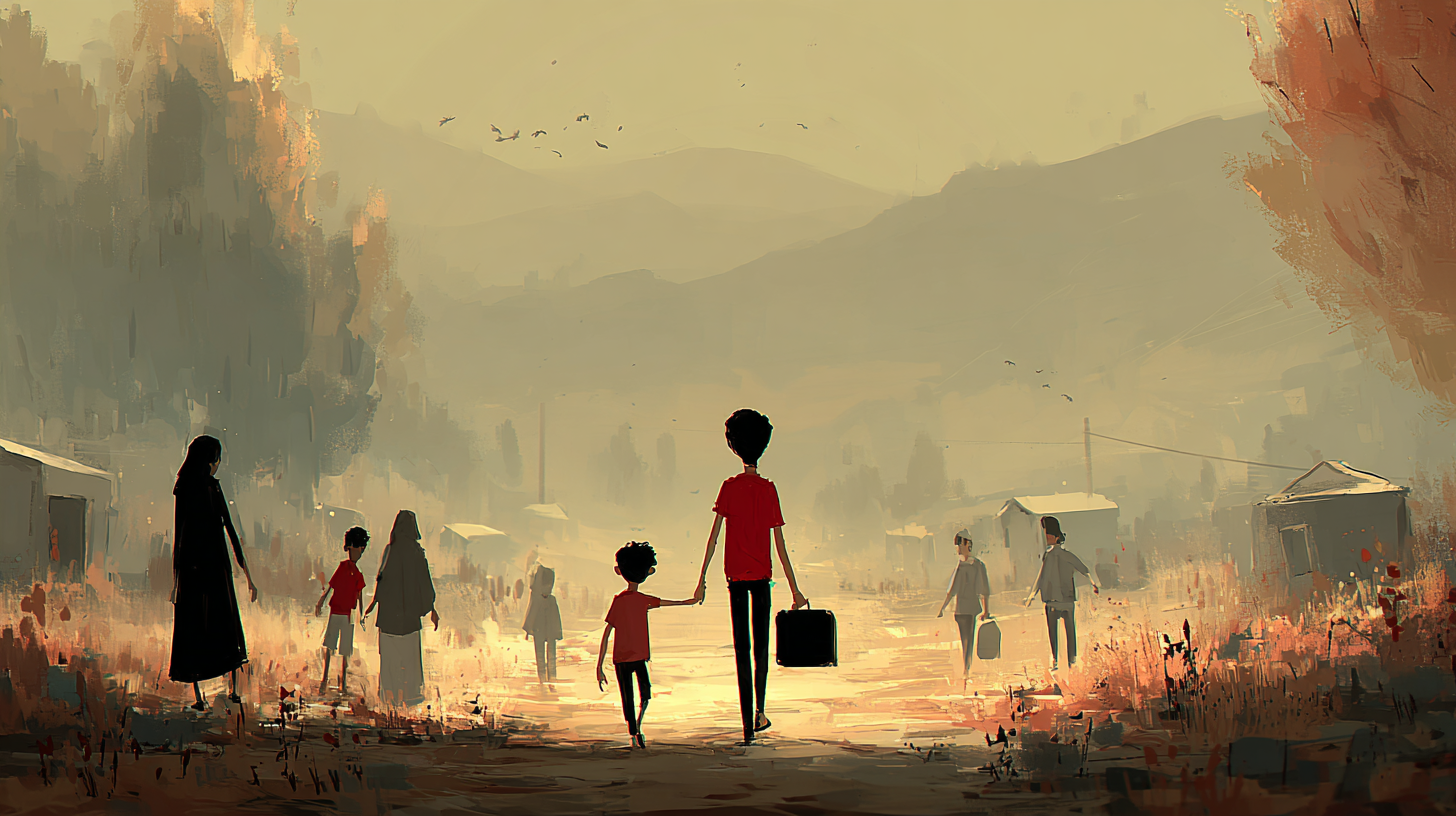A “refugee” is a person who runs away from war or danger.
「refugee」とは、戦争や災害などから逃げてきた人のことです。
以下は英単語 “refugee” に関するストーリー型学習コンテンツです。まずは大枠の意味を理解して最後の文章で確認しましょう。
主な意味(main meaning)
| 品詞 | 意味 | 発音記号(IPA) | 例文 |
|---|---|---|---|
| 名詞 | 戦争や災害、迫害から逃れてきた人 | /ˌref.jʊˈdʒiː/ | Many refugees crossed the border to find safety. |
語源(etymology)
「refugee」はフランス語「réfugié」に由来し、さらにラテン語「refugium(避難所)」から来ています。
核となるイメージは「安全な場所を求めて逃れる人」です。
類義語(synonyms)
| 類義語 | 例文 |
|---|---|
| evacuee | The evacuees were moved to a safe location during the storm. |
| asylum seeker | The asylum seeker applied for protection in a new country. |
| migrant | Many migrants move to cities to find work. |
| displaced person | The earthquake left thousands of displaced persons in need of shelter. |
| exile | He lived in exile for many years after fleeing his country. |
反義語(antonyms)
| 反義語 | 例文 |
|---|---|
| citizen | As a citizen, she has the right to vote. |
| resident | He is a permanent resident of this town. |
コロケーション(collocations)
| コロケーション | 例文 |
|---|---|
| refugee camp | The refugee camp provided food and shelter. |
| refugee crisis | The refugee crisis is a global issue. |
| refugee status | She applied for refugee status in Canada. |
| accept refugees | The country decided to accept more refugees. |
| refugee policy | The government changed its refugee policy. |
2項表現(binomials)
| 表現 | 例文 |
|---|---|
| war and peace | The book is about the contrast between war and peace. |
| hopes and fears | Refugees carry their hopes and fears with them. |
| laws and regulations | Refugees must follow the country’s laws and regulations. |
英語ストーリー(english story)
Title: A New Beginning
Sami was a refugee from Syria. He arrived in Germany with his family after fleeing the war. They had lived in a refugee camp for several months before being accepted by the government. At first, life was difficult. They didn’t speak German, and Sami missed his friends. But his parents encouraged him to study hard and make new friends.
In school, Sami met other students who were also migrants. One girl was an asylum seeker from Ukraine, and another boy was an evacuee from a flood-hit area in India. They all shared similar experiences and supported each other.
Sami learned about Germany’s refugee policy and how it provided help for displaced persons. He also learned that getting refugee status meant he could stay in the country legally. With time, Sami felt less like an exile and more like a resident.
One day, the class discussed the global refugee crisis. Sami shared his story, and his classmates listened carefully. He explained the difference between a refugee and a citizen. His teacher praised him for his courage and clear explanation.
Sami realized that war and peace were both parts of life, but peace gave people the chance to grow. He had hopes and fears, like everyone else. But now, he also had dreams.
和訳
タイトル:新たな始まり
サミはシリアからの**refugee(難民)だった。戦争から逃れ、家族と一緒にドイツへやって来た。政府に受け入れられる前は、数ヶ月間refugee camp(難民キャンプ)**で暮らしていた。最初は生活が大変だった。ドイツ語が話せず、サミは友だちが恋しかった。でも、両親は彼に一生懸命勉強して新しい友だちを作るよう励ました。
学校で、サミは他の**migrants(移住者)と出会った。ある女の子はウクライナからのasylum seeker(亡命希望者)で、もう一人の男の子はインドの洪水被災地からのevacuee(避難者)**だった。彼らは似たような経験をしていて、お互いに支え合った。
サミはドイツの**refugee policy(難民政策)**について学び、**displaced persons(住む場所を失った人)**への支援制度を知った。また、**refugee status(難民資格)を得ることで、合法的に滞在できることも理解した。時が経つにつれて、サミはexile(亡命者)**ではなく、**resident(住民)**としての感覚を持つようになった。
ある日、クラスで世界的な**refugee crisis(難民危機)について話し合った。サミは自分の体験を語り、クラスメイトは真剣に耳を傾けた。彼はrefugee(難民)とcitizen(市民)**の違いを説明した。先生はその勇気とわかりやすい説明を褒めた。
サミは「war and peace(戦争と平和)」がどちらも人生の一部であることに気づいた。しかし、平和こそが人々に成長のチャンスを与えてくれるのだと感じた。彼にも**hopes and fears(希望と不安)**があったが、今は夢もある。
Q&A
- Q「refugee」と「evacuee」の違いは何ですか?
- A
「refugee(難民)」は、戦争や迫害などの理由で国や故郷を離れて避難する人を指します。一方「evacuee(避難者)」は、災害や事故のために一時的に避難する人で、元の場所に戻る可能性が高い点が異なります。
- Q「refugee」と「asylum seeker」の違いは何ですか?
- A
「asylum seeker(亡命希望者)」は、他国に保護を求めている段階の人で、まだ難民として正式に認められていません。「refugee(難民)」は、その申請が認められて法的に保護されている人です。
- Q「refugee」と「migrant」の違いは何ですか?
- A
「migrant(移住者)」は、仕事や生活の向上を目的に自分の意思で移動する人です。「refugee(難民)」は、命の危険など強制的な理由で国を離れる人です。
- Q「refugee」と「displaced person」の違いは何ですか?
- A
「displaced person(避難民・住む場所を失った人)」は、国内外を問わず、住んでいた場所から逃れざるを得なかった人を広く指します。「refugee(難民)」は、国を越えて逃げ、他国の保護を受けている人に限ります。
- Q「refugee」と「exile」の違いは何ですか?
- A
「exile(亡命者)」は、政治的な理由などで国を追われた人、あるいは国外にとどまることを選んだ人を意味します。「refugee(難民)」はより広く、戦争や迫害などによって避難してきた人全般を指します。
- Q「refugee camp」と「refugee」の違いは何ですか?
- A
「refugee(難民)」は人を指す言葉です。一方「refugee camp(難民キャンプ)」は、難民たちが一時的に生活するために設けられた場所を意味します。
- Q「refugee crisis」と「refugee」の違いは何ですか?
- A
「refugee crisis(難民危機)」は、大量の難民が発生し、受け入れ国や国際社会が対応に苦しんでいる状況を指します。「refugee」はその状況の当事者である人々を意味します。
- Q「refugee status」と「refugee」の違いは何ですか?
- A
「refugee status(難民資格)」は、政府や国際機関が特定の人を法的に難民と認めた状態を意味します。「refugee」は、そのような資格を持っている、または申請中の人そのものを指します。
- Q「accept refugees」と「refugee」の違いは何ですか?
- A
「accept refugees(難民を受け入れる)」は、国や地域が難民の入国や滞在を許可する行動を指します。「refugee」は、その受け入れ対象となる人々です。
- Q「refugee policy」と「refugee」の違いは何ですか?
- A
「refugee policy(難民政策)」は、国が難民をどのように受け入れるか、どんな支援をするかなどを定めた制度や方針です。「refugee」はその政策の対象者です。



コメント